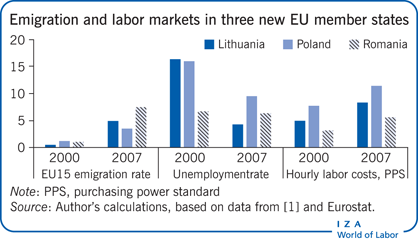Elevator pitch
The recent EU enlargements into Central and Eastern Europe and increased labor mobility within the Union provide a unique opportunity to evaluate the labor market effects of emigration. Outmigration has contributed to higher wages for stayers, as well as to lower unemployment in the source country. However, emigration has also exacerbated skills shortages in some sectors, as well as mismatches between skills and jobs.

Key findings
Pros
Outmigration has reduced the excess supply of labor and lowered unemployment.
Outmigration has increased the wages of stayers, especially for socio-economic groups that have become relatively scarce.
There are potential benefits from return migrants with enhanced human capital.
Labor migrants send cash to their home economies.
Labor migration may act as an adjustment mechanism during periods of macroeconomic shocks and its importance increases as more countries join the Euro currency zone.
Cons
Outmigration may amplify labor and skills shortages in certain sectors.
Outmigration has exacerbated mismatches between skills and jobs.
Outmigration may lead to brain drain and brain waste.
Inflationary pressure may be attributable to the consequences of emigration.
Outmigration exacerbates demographic pressures and pressures on public budgets.